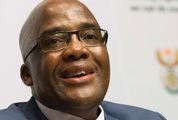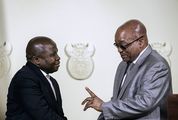Source:

BUSINESS DAY TV: MTN ‘taking strain’ in Nigeria
by Transcript service,
2015-12-04 15:06:46.0
DOBEK Pater is from Africa Analysis and Mohammed Nalla is from Nedbank Corporate and Investment Banking.
BUSINESS DAY TV: MTN Nigeria’s fine has been reduced by more than a third, to $3.4bn, with the telcos operator given until the end of the month to pay up. Dobek Pater, MD of Africa Analysis, joins us now. Still with us in the studio is Mohammed Nalla as well.
Thanks so much Dobek. So the fine’s been cut, we’ve got Phuthuma Nhleko saying negotiations are still under way. Do you think that we’re going to see any more resolution on this and any more whittling away of what’s been dished out?
DOBEK PATER: Possibly, my expectation was that it would be cut to a lower denomination, say maybe around $2bn or just to a large amount between $1bn and $2bn maybe, and the payment terms would be not as prompt and perhaps spread over a year in instalments.
But $3.5bn payable within less than a month, it is a very harsh punishment so to speak.
BDTV: Absolutely. We’re still looking, Mohammed, at R50bn that needs to be paid here. Implications for shareholders as you see it? Will MTN have no choice but to cut their dividend in order to fund this at this rate?
MOHAMMED NALLA: Yes but they certainly have the scope for doing that so the dividend’s been one of those really nice things about MTN. It is a nice cash-generative business, dividends a bit on the high side. Undoubtedly it’s going to be a combination of cutting the dividend maybe, raising some of the leverage within the business. As I mentioned to you, they still have some dollars sitting in Nigeria which they could potentially utilise to offset some of this but it’s going to come through with some strain.
BDTV: Yes, and of course as they experience that kind of strain we’re seeing some rejigging of the business as well. Dobek, we’re seeing a reverting to an old structure, so to spea. Was it a mistake to deviate from that in the first place in your books?
DP: Nigeria-South Africa were reporting directly to group, for instance, as operations as opposed to a region. One would have thought that with such direct reporting there would be more control from group level at what’s happening in those particular markets. Perhaps there was and this is the reason that we see the result of that in Nigeria.
I’m not sure that reverting back to a regional structure that Nigeria would report to ... and South Africa report to .. rather than directly to group would necessarily improve things because the bottom line is ... it lies with the people who manage that structure at different levels, whether it’s at group level, whether it’s at regional level or country level.
BDTV: Having said that, we’ve got a new CEO now being appointed. Are you saying that it’s about time?
DP: We’ve got a new CEO?
BDTV: At MTN Nigeria.
DP: Oh, in Nigeria. We do, yes, certainly. I’m not sure it’s about time. Until we found out what happened in terms of not deactivating the SIM cards it seemed like the previous CEO was doing fairly well, quite well, in fact in terms of performance of MTN given the relatively difficult market conditions.
I am, however, surprised that it took that long perhaps to change the CEO in Nigeria post the exposure of the whole fiasco, so to speak.
BDTV: Absolutely, and MTN at this point still saying that it’s going to be engaging with Nigerian authorities before responding formally.
MN: I’d expect them to do that, $3.5bn is still a massive amount of money and whilst I believe the Nigerians have certainly given some room with regards to the size of the fine I agree with Dobek — to expect that to be paid within the time frame of another three weeks, at a time when markets are effectively going into lower liquidity holding periods — it’s the holiday period and so forth — that’s rather punitive. So I would suspect that a lot of those negotiations will probably centre around payment terms associated with that, maybe stretching out some of that payment profile. But that’s conjecture at best right now.
BDTV: Absolutely. I picked up a note from Vestact today saying that the company should rather commit to a speedier ramp-up of 3G tower rollout. The country should be more innovative in how they are going to be penalising a company like MTN that basically supports the bulk of its telcos infrastructure?
DP: Yes, 3G and certainly moving into 4G, or perhaps the market is not quite ready for 4G yet. MTN has been investing significant amounts in infrastructure in Nigeria, including 3G rollout. Yes, they could be settled with additional obligations to go more into perhaps the outlying rural areas even, that depends on the spectrum they would have available for that. It would be a solution in order to promote broadband deployment and uptake in Nigeria. If you do collect the money from MTN and if it’s put to the correct use and you could argue that money could be used to encourage other operators for instance to deploy broadband infrastructure at a quicker pace by subsidising it perhaps.
BDTV: Again, I have to ask this: is the government in Nigeria looking for stopgap measures to plug a hole in what is a yawning budget deficit?
DP: I suppose that is one of those conspiracy theories but if you look at the fact that the Nigerian budget was budgeted at around $54 per barrel and now we’re down to $44 to $45, it is a significant gap of 10% so maybe that temptation is there, I’ve never really subscribed to it but I suppose you can’t really discount it.
The NCC — the regulator in Nigeria — has made it clear even before we’ve seen the budget deficit/deficiency, that these are the rules. There is going to be roughly $1,000 per SIM card and if you don’t deactivate those SIM cards by a given date this is the punishment that will be meted out to you as an operator for noncompliance with the regulations.
BDTV: We’re going to have to wait and see how this all unfolds. Gentlemen, thanks so much for having joined us today.
DOBEK Pater is from Africa Analysis and Mohammed Nalla is from Nedbank Corporate and Investment Banking.
BUSINESS DAY TV: MTN Nigeria’s fine has been reduced by more than a third, to $3.4bn, with the telcos operator given until the end of the month to pay up. Dobek Pater, MD of Africa Analysis, joins us now. Still with us in the studio is Mohammed Nalla as well.
Thanks so much Dobek. So the fine’s been cut, we’ve got Phuthuma Nhleko saying negotiations are still under way. Do you think that we’re going to see any more resolution on this and any more whittling away of what’s been dished out?
DOBEK PATER: Possibly, my expectation was that it would be cut to a lower denomination, say maybe around $2bn or just to a large amount between $1bn and $2bn maybe, and the payment terms would be not as prompt and perhaps spread over a year in instalments.
But $3.5bn payable within less than a month, it is a very harsh punishment so to speak.
BDTV: Absolutely. We’re still looking, Mohammed, at R50bn that needs to be paid here. Implications for shareholders as you see it? Will MTN have no choice but to cut their dividend in order to fund this at this rate?
MOHAMMED NALLA: Yes but they certainly have the scope for doing that so the dividend’s been one of those really nice things about MTN. It is a nice cash-generative business, dividends a bit on the high side. Undoubtedly it’s going to be a combination of cutting the dividend maybe, raising some of the leverage within the business. As I mentioned to you, they still have some dollars sitting in Nigeria which they could potentially utilise to offset some of this but it’s going to come through with some strain.
BDTV: Yes, and of course as they experience that kind of strain we’re seeing some rejigging of the business as well. Dobek, we’re seeing a reverting to an old structure, so to spea. Was it a mistake to deviate from that in the first place in your books?
DP: Nigeria-South Africa were reporting directly to group, for instance, as operations as opposed to a region. One would have thought that with such direct reporting there would be more control from group level at what’s happening in those particular markets. Perhaps there was and this is the reason that we see the result of that in Nigeria.
I’m not sure that reverting back to a regional structure that Nigeria would report to ... and South Africa report to .. rather than directly to group would necessarily improve things because the bottom line is ... it lies with the people who manage that structure at different levels, whether it’s at group level, whether it’s at regional level or country level.
BDTV: Having said that, we’ve got a new CEO now being appointed. Are you saying that it’s about time?
DP: We’ve got a new CEO?
BDTV: At MTN Nigeria.
DP: Oh, in Nigeria. We do, yes, certainly. I’m not sure it’s about time. Until we found out what happened in terms of not deactivating the SIM cards it seemed like the previous CEO was doing fairly well, quite well, in fact in terms of performance of MTN given the relatively difficult market conditions.
I am, however, surprised that it took that long perhaps to change the CEO in Nigeria post the exposure of the whole fiasco, so to speak.
BDTV: Absolutely, and MTN at this point still saying that it’s going to be engaging with Nigerian authorities before responding formally.
MN: I’d expect them to do that, $3.5bn is still a massive amount of money and whilst I believe the Nigerians have certainly given some room with regards to the size of the fine I agree with Dobek — to expect that to be paid within the time frame of another three weeks, at a time when markets are effectively going into lower liquidity holding periods — it’s the holiday period and so forth — that’s rather punitive. So I would suspect that a lot of those negotiations will probably centre around payment terms associated with that, maybe stretching out some of that payment profile. But that’s conjecture at best right now.
BDTV: Absolutely. I picked up a note from Vestact today saying that the company should rather commit to a speedier ramp-up of 3G tower rollout. The country should be more innovative in how they are going to be penalising a company like MTN that basically supports the bulk of its telcos infrastructure?
DP: Yes, 3G and certainly moving into 4G, or perhaps the market is not quite ready for 4G yet. MTN has been investing significant amounts in infrastructure in Nigeria, including 3G rollout. Yes, they could be settled with additional obligations to go more into perhaps the outlying rural areas even, that depends on the spectrum they would have available for that. It would be a solution in order to promote broadband deployment and uptake in Nigeria. If you do collect the money from MTN and if it’s put to the correct use and you could argue that money could be used to encourage other operators for instance to deploy broadband infrastructure at a quicker pace by subsidising it perhaps.
BDTV: Again, I have to ask this: is the government in Nigeria looking for stopgap measures to plug a hole in what is a yawning budget deficit?
DP: I suppose that is one of those conspiracy theories but if you look at the fact that the Nigerian budget was budgeted at around $54 per barrel and now we’re down to $44 to $45, it is a significant gap of 10% so maybe that temptation is there, I’ve never really subscribed to it but I suppose you can’t really discount it.
The NCC — the regulator in Nigeria — has made it clear even before we’ve seen the budget deficit/deficiency, that these are the rules. There is going to be roughly $1,000 per SIM card and if you don’t deactivate those SIM cards by a given date this is the punishment that will be meted out to you as an operator for noncompliance with the regulations.
BDTV: We’re going to have to wait and see how this all unfolds. Gentlemen, thanks so much for having joined us today.





















Login OR Join up TO COMMENT